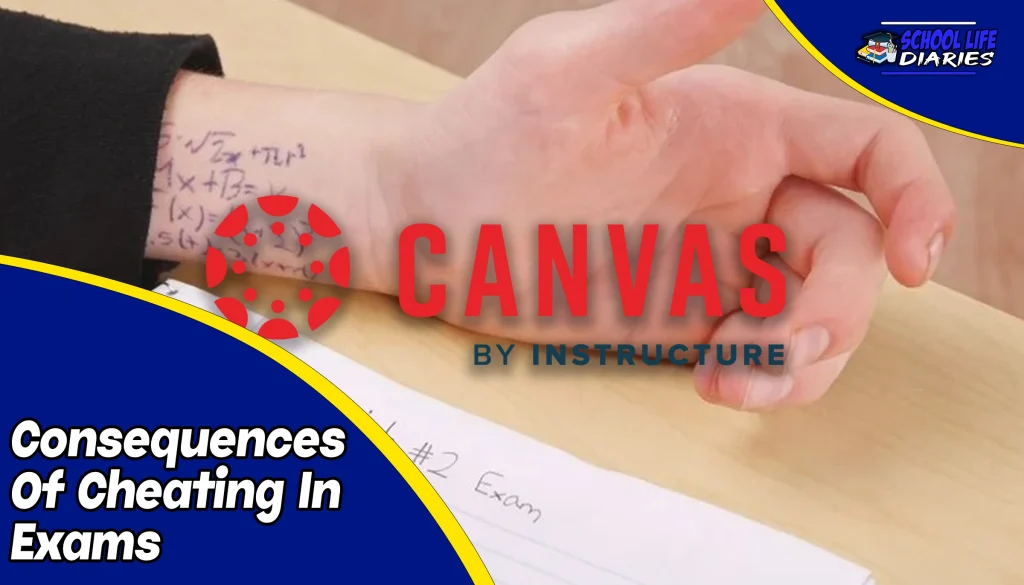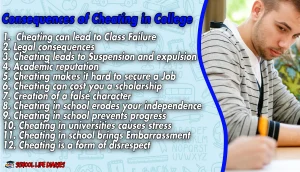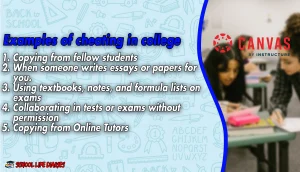Cheating in exams is a serious issue that has far-reaching consequences for both individuals and society as a whole. It undermines the integrity of the education system, diminishes the value of qualifications, and erodes trust between students, teachers, and institutions.
Consequently, deserving students may miss out on opportunities such as scholarships or admission into competitive programs due to unfair competition from those who cheat.
Consequences of Cheating in College
Cheating in college exams can have serious consequences for students.
1. Cheating can lead to Class Failure
Academic dishonesty, such as cheating during exams, has the potential to result in students failing their classes. When students resort to cheating as a means to achieve better class performance, they not only compromise their academic integrity but also put their future at risk. The consequences of cheating can extend beyond immediate academic repercussions and have long-lasting effects on a student’s educational journey.
One of the primary academic consequences of cheating is the failure to grasp essential concepts and skills that are necessary for success in subsequent courses. Cheating stains a student’s reputation and raises questions about their character and reliability. A failed class due to cheating may leave a permanent mark on their academic transcript, potentially limiting opportunities for internships or postgraduate studies.
2. Legal consequences
The legal consequences of cheating in exams can have a long-lasting impact on one’s future. When employers or educational institutions discover that an individual has been involved in academic dishonesty, it raises questions about their character and ability to follow ethical practices. This can severely damage their reputation and hinder their chances of securing employment or admission into higher education programs. Moreover, having a criminal record for cheating can limit one’s opportunities for professional licensure or certification in certain fields where integrity is highly valued.
Cheating in exams not only undermines educational integrity but also carries significant legal consequences. Those who engage in such practices risk facing legal actions that can have far-reaching effects on their future prospects. It is important for individuals to understand the gravity of these consequences and make ethical choices when it comes to academic pursuits.
3. Cheating leads to Suspension and expulsion
Suspension and expulsion are disciplinary measures commonly imposed in response to dishonest practices that compromise the integrity of the educational system. When students engage in cheating during exams, they not only undermine their own learning but also violate the trust and fairness upon which academic institutions are built.
The consequences of suspension can be severe, as it involves a temporary removal from school for a specified period of time. During this period, students are barred from attending classes, participating in extracurricular activities, and accessing resources provided by the institution. This interruption in education can significantly impact a student’s academic progress and overall development.
Expulsion is an even more drastic repercussion of academic dishonesty. It entails a permanent dismissal from the educational institution, effectively ending any further enrollment or association with the school. Expulsion carries long-lasting consequences beyond just missing out on education opportunities. It tarnishes one’s academic record and reputation, making it difficult to gain admission into other institutions or pursue certain career paths that require a clean disciplinary history.
4. Academic reputation
A strong academic reputation is built upon a foundation of integrity and ethical conduct in educational institutions. Academic integrity refers to the honesty, trustworthiness, and ethical behavior expected from students and faculty members within an academic setting. It encompasses various aspects such as avoiding plagiarism, citing sources correctly, and conducting research with honesty and transparency.
Reputation management plays a crucial role in maintaining the academic reputation of an institution. Ethical behavior is essential for creating a conducive learning environment where knowledge is valued and respected. When students engage in cheating during exams, it undermines the principles of fairness and equal opportunities for all learners. To uphold academic integrity and manage their reputation effectively, educational institutions need to emphasize ethical behavior among their students through awareness campaigns, workshops on proper citation techniques, and clear guidelines on acceptable conduct during exams.
5. Cheating makes it hard to secure a Job
Cheating during exams not only undermines a student’s academic integrity but also raises serious concerns about their ethical values, which can have far-reaching consequences on their future career opportunities. Employers value honesty and integrity as fundamental qualities in potential employees, and discovering a candidate’s history of cheating can severely tarnish their chances of securing a job.
With competition for employment becoming increasingly fierce, employers are constantly seeking candidates who possess strong moral character and uphold the principles of fairness and trustworthiness. Consequently, those who succumb to the allure of cheating must grapple with the long-term impact on their personal growth, self-esteem, and ability to make ethically sound choices in future endeavors.
6. Cheating can cost you a scholarship
Scholarship opportunities can be lost as a result of engaging in dishonest practices during academic evaluations. Cheating not only undermines the integrity of the evaluation process but also has long-term consequences that can impact one’s future prospects. Many scholarships require applicants to demonstrate academic excellence and ethical conduct, making cheating a significant deterrent.
The impact on future prospects cannot be overstated. Scholarships provide financial support for students pursuing higher education and open doors to various opportunities such as internships, research projects, or study abroad programs. Cheating not only disqualifies individuals from immediate consideration but also diminishes their reputation and credibility over time. The impact extends beyond financial aid as it hinders access to valuable experiences and raises doubts about one’s abilities in competitive environments where integrity is paramount.
7. Creation of a false character
When students resort to creating a false character in order to cheat in exams, they not only undermine their own personal growth but also compromise the principles upon which academic institutions are built. The consequences of creating a false character extend beyond personal growth and affect the broader notion of academic integrity. It creates an unfair advantage for those who engage in such deceitful practices while disadvantaging honest students who have diligently worked towards achieving genuine success.
8. Cheating in school erodes your independence
When students resort to cheating in school, they are essentially relinquishing their independence by relying on illicit means to achieve academic success. By not putting in the necessary effort and taking shortcuts, students miss out on valuable opportunities for personal growth and development. In essence, cheating prevents them from learning essential skills such as critical thinking, problem-solving, and perseverance that are crucial for their future endeavors.
The impact of cheating on personal growth extends beyond the educational setting and can have severe consequences in adulthood. Students who habitually cheat may struggle with decision-making and lack confidence in their abilities to tackle challenges independently. This eroded sense of independence can hinder their professional development as they enter the workforce or pursue higher education.
9. Cheating in school prevents progress
Academic dishonesty in educational settings hinders the forward momentum of personal and intellectual growth, creating a stagnant environment where genuine progress becomes elusive. When students resort to cheating in school, they bypass the essential process of learning and understanding the material. By taking shortcuts, they deprive themselves of valuable opportunities to develop critical thinking skills, problem-solving abilities, and a deep understanding of the subject matter.
To prevent cheating and promote integrity in schools, academic institutions have implemented various measures such as academic integrity programs. These programs aim to educate students about the importance of ethical behavior in academia and provide resources for developing good study habits. By instilling a sense of responsibility and emphasizing honesty, these initiatives encourage students to take ownership of their education and learn through legitimate means.
10. Cheating in universities causes stress
Cheating in universities contributes to heightened levels of stress among students. The pressure to perform well academically can lead some students to resort to cheating as a means of achieving success. However, the consequences of such actions often result in increased stress levels. Students who cheat may experience constant anxiety and fear of getting caught, which can negatively impact their mental well-being.
One major factor contributing to the stress caused by cheating is the lack of effective stress management techniques. When students rely on cheating instead of developing their skills and knowledge, they miss out on opportunities for personal growth and self-improvement. This reliance on dishonest practices creates a cycle of stress and dependence, as students become increasingly anxious about maintaining their academic performance through unethical means.
11. Cheating in school brings Embarrassment
Embarrassment is a common emotion experienced by students who engage in dishonest practices within the educational system. Cheating in school not only undermines the integrity of the academic environment but also has significant psychological and social consequences for those involved.
When students resort to cheating, they often experience a profound sense of embarrassment, knowing that their actions go against established norms and values. The psychological impact of cheating-induced embarrassment can be profound. Students may feel guilty and ashamed for their dishonesty, leading to increased stress and anxiety levels. This emotional burden can affect their overall well-being and academic performance, as it becomes difficult to focus on learning when plagued by feelings of embarrassment.
12. Cheating is a form of disrespect.
One of the key aspects to consider when examining the act of cheating is the underlying disrespect it displays towards the educational system and its values. Cheating in exams is a form of disrespectful behavior that undermines the principles of academic integrity and moral values. This disrespectful behavior not only compromises their own personal growth but also diminishes the credibility and value of education as a whole.
Cheating reflects a lack of appreciation for the learning process and devalues the efforts put forth by both educators and students who adhere to ethical principles. It sends a message that shortcuts and deceitful practices are acceptable means to achieve success, undermining the foundational basis upon which education stands.
Effect of Cheating on the Learning Process
The impact of dishonesty during exams can have significant implications for the overall educational experience. Cheating not only undermines the integrity of the learning process but also has detrimental effects on motivation. When students resort to cheating, they are essentially bypassing the opportunity to engage with the material and develop a deep understanding of the subject matter. This lack of genuine effort and comprehension can lead to a decrease in intrinsic motivation, as students become more focused on achieving high grades rather than truly mastering the content
Examples of cheating in college
Cheating in college can take various forms, including copying from fellow students during exams or assignments. Another example of cheating is when someone pays another person to write essays or papers for them.
1. Copying from fellow students
Copying from fellow students during exams undermines the integrity of the assessment process and compromises the fairness of grading. This act not only has serious consequences for the individuals involved but also poses ethical implications and challenges academic integrity. When students resort to copying, they disregard the importance of genuine learning and academic growth. Consequently, their education becomes superficial and lacks the necessary depth that would prepare them for future challenges.
Copying from fellow students during exams not only has immediate consequences for those involved but also raises important ethical concerns regarding academic integrity. The act itself undermines genuine learning opportunities and inhibits personal growth in critical areas such as problem-solving and independent thinking. Moreover, it disrupts fairness in grading processes and erodes trust within educational institutions.
2. When someone writes essays or papers for you.
Outsourcing the writing of essays or papers undermines the authenticity of academic work and hinders the development of critical thinking skills and independent research abilities. When someone else writes an essay or paper on behalf of a student, it not only compromises their academic integrity but also deprives them of valuable learning opportunities.
Plagiarism detection tools have become increasingly sophisticated in recent years, making it easier for educators to identify instances of outsourced writing. The prevalence of such unethical practices raises serious ethical implications within educational institutions.
Outsourcing the writing of essays or papers has severe consequences on both individual students’ academic growth as well as broader educational systems’ integrity. It undermines authenticity by compromising academic rigor while hindering critical thinking skills and independent research abilities. The use of plagiarism detection tools serves as a deterrent against such practices but cannot completely eradicate them entirely.
3. Using textbooks, notes, and formula lists on exams
Utilizing textbooks, notes, and formula lists during examinations can significantly impact the educational integrity of the assessment process while potentially hindering the development of critical thinking skills and a deep understanding of the subject matter. Academic dishonesty is a serious concern in educational institutions, as it goes against the principles of fairness and equality.
Allowing students to rely on external resources during exams undermines the purpose of assessing their knowledge and proficiency in a particular subject. When students have access to textbooks, notes, or formula lists during exams, they may rely solely on these materials instead of actively engaging with the course content. This reliance not only diminishes their ability to think critically but also prevents them from fully comprehending complex concepts. Exams are designed not just to test factual recall but also to assess students’ analytical skills and their ability to synthesize information.
Allowing students to use textbooks, notes, and formula lists during examinations can compromise educational integrity by promoting academic dishonesty. It limits opportunities for critical thinking development and impedes a thorough grasp of course material. To ensure an effective assessment process that fosters genuine learning outcomes, it is crucial for educational institutions to discourage such exam preparation methods that undermine intellectual growth and hinder academic progress.
4. Collaborating in tests or exams without permission
Collaborating with others during tests or exams without proper authorization can compromise the integrity of the assessment process and undermine the principles of fairness and equality in education. Collaborative learning, when properly facilitated and authorized by instructors, can be a valuable educational tool that promotes critical thinking and problem-solving skills.
Collaborating in tests or exams without proper authorization is detrimental to both individuals involved and the integrity of education as a whole. It is important for students to understand that academic success should be based on one’s own efforts and abilities rather than relying on unauthorized collaboration. Upholding ethical behavior is crucial for maintaining fairness, equality, and credibility within educational institutions.
5. Copying from Online Tutors
Online tutoring has become increasingly popular due to its convenience and accessibility. Students can seek help from qualified tutors anytime, anywhere, and access a wide range of study materials. While online tutoring offers numerous benefits for students, it is important to recognize the potential risks associated with this practice. Copying answers directly from online tutors not only undermines the purpose of examinations but also violates academic integrity. Plagiarism prevention strategies play a crucial role in addressing this issue.
Educational institutions should prioritize implementing strict policies against cheating and plagiarism, educating students about the importance of academic honesty, and providing resources for developing effective study skills. Implementing plagiarism prevention strategies and comprehensive academic integrity programs can help instill a sense of responsibility among students while promoting ethical conduct in their educational journey.
Solutions to cheating in school
In order to address the issue of cheating in school, it is crucial to educate students on the importance of honesty and integrity. This can be done through regular discussions and workshops that highlight the negative consequences of cheating and emphasize the value of ethical behavior.
1. Educating students on the importance of honesty
To instill principles of honesty in students, it is imperative to educate them about the significance of integrity during examinations. Emphasizing the importance of ethical behavior in academic settings helps foster a culture of integrity and promotes academic honesty. By educating students on the consequences of cheating and highlighting the value of honesty, educational institutions can create an environment where students understand the long-term benefits of maintaining their integrity.
Educating students about the importance of ethical behavior lays the foundation for fostering a culture of integrity within educational institutions. When students are aware that dishonesty can have serious repercussions not only on their academic journey but also on their personal growth and development, they are more likely to adhere to guidelines promoting honesty. Promoting academic honesty goes beyond just preventing cheating; it encourages critical thinking skills, self-discipline, and intellectual growth.
2. Creating anti-cheating pledges
Creating anti-cheating pledges can be a powerful tool in addressing the issue of cheating in exams. These pledges serve as a visible reminder for students to uphold their integrity and make ethical choices when faced with academic challenges. By signing such a pledge, students publicly declare their commitment to honest practices, creating awareness not only among themselves but also among their peers. This collective effort towards maintaining academic honesty can have a profound impact on reducing incidents of cheating.
Creating anti-cheating pledges is an effective strategy for discouraging cheating in exams as it creates awareness about its consequences, promotes student accountability, and builds trust within educational institutions. By encouraging students to actively commit themselves to uphold academic honesty through these pledges, a culture of integrity and personal responsibility can be fostered. Implementing such measures not only deters cheating but also instills valuable life skills and values in students that extend beyond the academic realm.
3. Instructors changing the definition of success
An alternative approach employed by instructors involves redefining the criteria for achieving success within an academic context. Rather than solely focusing on exam performance, instructors are changing expectations and placing greater emphasis on alternative assessments to evaluate students’ understanding and knowledge.
This shift in mindset aims to reduce the pressure that often leads to cheating and encourages students to engage more deeply with the material. By changing the definition of success, instructors aim to create a learning environment that focuses on growth and understanding rather than simply memorizing information for exams. This change has a significant impact on students as it encourages them to develop critical thinking skills, problem-solving abilities, and a deeper comprehension of the subject matter.
Conclusion
Cheating in exams has serious consequences in college. Students who are caught cheating may face disciplinary actions such as receiving a failing grade for the exam or even being expelled from the institution. To combat cheating, schools can implement various solutions. Firstly, they can promote a culture of academic honesty by educating students about the negative consequences of cheating and emphasizing the importance of ethical conduct.
Schools can implement strict monitoring measures during exams to deter and detect instances of cheating. This can include using proctors or invigilators during exams or employing technology tools such as anti-plagiarism software to identify plagiarized content. By promoting academic integrity and implementing effective preventive measures, we can ensure that exams serve their intended purpose – assessing students’ true abilities and preparing them for success in their future endeavors without resorting to dishonest practices.







